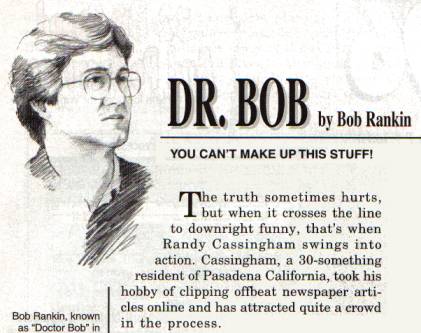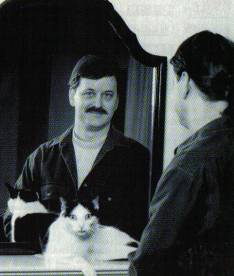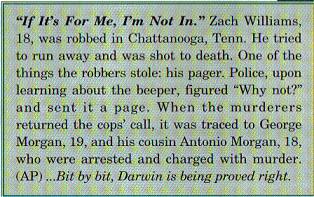Interview with Randy Cassingham - Internet Pioneer (Jan 1996)

Thousands of Internet users seeking relief from seriousness subscribe to "This Is True", a free weekly mailing list in which Cassingham summarizes and comments on humorous news stories from around the world.
Inquiring minds want to know the true story behind This is True, Cassingham's new book "Deputy Kills Man With Hammer", and what it's like to have a global virtual audience, so here are some excerpts from my recent chat with Randy Cassingham.

DOC: Randy, what motivated you to start publishing This Is True?
RC: It grew out of a hobby -- I've been clipping weird articles for many years, and writing comments on them. As my local friends moved away, they lamented the loss of reading these on my bulletin board (cork, that is, not a BBS). I started mailing them out, but that got old really fast, so I switched to e-mail. Even that got out of hand quickly, so I re-thought the whole idea and came up with the format it's in now: a weekly column.
Like a lot of writers, I've always wanted to do it full time, but it's a tough business to break into. I figured that making it "professional" from the outset, and making it available on the Internet, would very quickly let me know if it would create a demand -- a following. It did... at the end of the first year, I had an estimated 100,000 readers per week, in 80 countries. Currently, it's in the 150,000 range, and 88 countries that I know of.
DOC: Quite an impressive crowd. How do you get the material for TRUE?
RC: I read - a lot! Luckily, I can skim quite well. Really, since I have a journalism background, I have a knack for knowing if a story has a good possibility by reading the headline. Some are quite obvious - "Man Claims He Was Sleepwalking When He Shot Wife", for instance - but others may not be. "Man Sentenced to 35 Years" is a tip-off for me: why does some guy rate a story with a big headline? So then I check the article to see what the deal is. Sometimes, the answer is surprising, and that's just the kind of story I need.

DOC: Do you want people to send you funny stories they find?
RC: No. About half the time I already have the story, and I feel guilty if someone takes the time and effort to send me something I don't need. The other half of the time, the story is either YEARS old, or it's an "urban legend" that's been going around on the 'net for years. Some of them are extremely funny, but my column is called "This is True", not "This is a Funny Story That May or May Not be True".
Bottom line, what I tell my readers is, e-mail me if you've found a good story and ask if I have it; if not, I need you to mail it to me, with the date intact. I only want something if it's VERY recent, and then only if it's in a "legitimate" publication. I don't want any space alien abduction stories unless they're from the Washington Post.
DOC: I guess that rules out Usenet as a possible source for you. Is TRUE your only business or just a sideline? How much of your time does it consume?
RC: It consumes WAY too much time! About 30-40 hours a week right now. If I had time, I'd do more - too much is slipping between the cracks that I should do, but I like to get a little sleep now and then. The problem is I still have a day job. I'm an information system designer and process engineer during the day, but I plan to make the jump to TRUE full-time sometime in 1996. Maybe I'll move in with Scott Adams -- I hear he needs a roommate now that Pac Bell asked him to leave when "Dilbert" got successful.
DOC: Ah, the Day Job Syndrome! Do you mind telling me approximately how much money you're making with this bootstrap enterprise?
RC: Yes. Right now, it's very much in the red -- five figures, in fact. But I know there is good potential here, and I think it's worth the risk.
DOC: You've got a great product and a huge online readership. I'd be surprised if print publications weren't knocking down your door. What do you charge newspapers and magazines to run TRUE, and how many takers so far?
RC: They are in fact coming to me, and I'm only just now starting to strategize with a marketing professional to work out our campaign to sign up enough publications so I can quit my day job and still pay the rent. The humor feature market, which includes cartoons as well as columns, is very competitive - which is why I'm working in a different way to stand out from the crowd.
And with paper prices going through the roof, magazines and newspapers are trying to cut costs wherever they can. So it's tough, but I am getting customers - and the Internet is helping me find them all over the world. The fee is based on the size of the publication's circulation and how often and how much they use, and starts at just $15 per week since I want to encourage smaller publications to carry it - a market that the larger syndicators tend to ignore. It pays off: one of my first newspapers was a 2500-circulation weekly on the Alaska Highway in the middle of Canada. Obviously, for larger publications it goes a bit higher.
DOC: How long have you been wired, and what was your motivation for going online with TRUE?
RC: I first started using computers in about 1971, on a Model 33 teletype connected to an HP-2000C over a 110-baud acoustic coupler modem. My own first modem, a 300 baud direct connect, came along in 1983. I've always been comfortable with computers -- but for me, they're a tool, not a social be-all and end-all. I don't understand writers who say they can't write unless they're using a pen on a yellow pad; I can't handwrite worth a damn, and it's too slow! I use a Dvorak keyboard for that reason. I could never get over 50-55 wpm on Qwerty, but I run over 100 wpm on Dvorak, and it's easier. For a writer, output is money; I can get my output out about twice as fast now: what's that worth?
DOC: Speaking of worth, did you plan to offer a TRUE book right from the start or was that an afterthought?
RC: Right from the start. I generate a lot of text with TRUE - more than fits in the column - so there'll be a new one every year. I like books; you can hold them in your hand, take them anywhere, curl up with them in bed or bath, share them easily, skim, skip around, and they make cheap gifts. But searching for That Story You Liked So You Can Show Someone is tough -- I have a hard time finding "that" story, and I wrote the thing!
DOC: Randy, you're pretty adamant in your copyright statement about unauthorized redistribution of TRUE. Tell me why.
RC: There are a few reasons I'm adamant. The saying goes "Information wants to be free" on the Internet. I want to encourage that - I allow free forwarding - but I want people to remember that information is NOT free. Someone took time to create it, and they probably want to eat and pay the rent. Second, since I'm trying to create a following to help me sell the column to newspapers, I need to have an idea as to how many people are following it! So while I'm pretty free about letting BBSs carry TRUE to help attract subscribers to their services, I demand some statistics in exchange that I can use in my marketing. I can tell them that right now, for instance, there are 108 licensed BBSs carrying TRUE. Third, because I am selling it to newspapers and such, I need the copyright on there so that they don't just steal it - I want to eat and pay rent!
DOC: Since your material comes from copyrighted media sources, isn't TRUE itself a violation of copyright laws?
RC: Not at all. Fact cannot be copyrighted; it's the EXPRESSION of the fact that can be. I NEVER copy the articles; I rewrite them into my own style. I have to, and not just for copyright reasons: I want everything to be in my "voice", since that's what people are paying for, and also it's quite a bit of work to condense a 400-word story into 40 words, and still get the point across. So someone can, for instance, take the IDEAS out of my stories and, say, write a screenplay based on it, and I have no claim to it - nor would I want to have a claim on it. In fact, there is already a Hollywood screenwriting group subscribed to TRUE, and I think that's great. All I ask is an autographed copy of the script!
DOC: I understand you have some strong opinions about the Dvorak keyboard layout. Tell me more...
RC: I think it's pathetic that we still teach kids Qwerty when they could learn Dvorak in half the time, and then get on with what they're learning to type for: writing... programming... CREATING. What's the point in drilling a-s-d-f j-k-l-; when you could be drilling WORDS, and for a shorter amount of time? The only drawback is having two user populations -- it's tough to have a typewriter with both Dvorak and Qwerty keyboards on them. But on a computer it's trivial. I don't harp on Dvorak -- I've only mentioned it once or twice online, and not at all in my book -- but it's a great tool I use to be more successful.
DOC: Jack uses a Dvorak for similar reasons here at BW! ;-) Has publishing TRUE brought any unexpected opportunities your way?
RC: I get a lot of e-mail from people, and about 99% of it is positive. And it comes from all over the world. I get an average of 200 messages a day, and once I got 500. I do read it all, but obviously can't answer it all. As far as "opportunity" goes, TRUE is appearing in magazines in places that a normal syndicator probably wouldn't have taken it: a Swedish magazine, a small town Canadian newspaper, and I'm in negotiation with magazines in Russia and Slovakia. And, of course, a number of American publications, most of which don't normally use syndicators.
DOC: Any unpleasant surprises?
RC: Not too many, actually. I do get the occasional hate e-mail from people who don't like a story, or don't like my poking fun at their pet issue. I'm not terribly Politically Correct: I'll laugh at most anything, though I certainly have my limits. Usually, though, people that are the most upset didn't understand what I was saying; when I ask them to re-read the story, and take their blinders off, most of them come back later and say "Oh! You weren't making FUN of that lady in the wheelchair, you were SUPPORTING her!" and they go away happy. But no one can appeal to everyone, and TRUE has gotten bigger EVERY SINGLE DAY since the first day when I sent it to 50 friends with e-mail, so I guess I'm mostly on track.
DOC: What's the toughest thing about getting into print, and can you offer any words of advice to other aspiring syndicators?
RC: First, it helps to know the business - for instance, knowing that publishers are facing huge problems with paper prices right now means you can anticipate their questions, and have answers ready. But more, everyone thinks they can write because it's something we all learned in school. But we all learned to fingerpaint also, and you don't find too many people making a living as illustrators. So you have a lot of people trying to break into print because it is, after all, pretty cool. But it doesn't take long before they start to realize that it's a lot of WORK, and they drop out and get a real job, like Dad said they should.
So editors are wary of writers: is this person someone who will stick with it and deliver week after week, or just another "wannabe"? My advice is to write and write and write, and PROVE that you can turn out a quality product week after week after week. When you have a track record, a lot of clips, or a book or two, editors can respect that and they'll be much more likely to give you a chance.
This used to be Catch-22 advice: you need clips of published material to get published. But the Internet gives writers another outlet, a place to put their stuff out to the world. If you get two subscribers - your mom and your sister - you might get the hint that this isn't for you. But if the world beats a path to your door, there will be editors standing in that line too.
DOC: What's your absolute favorite TRUE headline?
RC: The first year, it was "Deputy Kills Man With Hammer" (upon which I commented "Didn't want to waste a bullet"). It was just so strange that it really stayed with me. So it HAD to be the title of the first book, and it is. Next year's title will probably be "Glow in the Dark Plants Could Help Farmers", unless something better comes along in the next few months -- but that one will be hard to beat. You gotta love this job!
This article was originally published in the January 1996 issue of Boardwatch Magazine.





